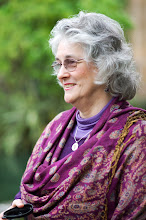- New Religious Movements Group, Strategies of Legitimation in New Religion, one talk in particular: "Jungian Archetypes, Metagenetics, and Kennewick Man: Scientific Discourses and Racial Theory in American Folkish Asatru," Carrie Dohe, University of Chicago.
- Ritual Studies Group, Case Studies in Ritual Practice, three papers: "Homa: An Exemplary Asian Fire Sacrifice, Holly Grether, UC Santa Barbara; "Dismantling Gender: Between Ancient Gnostic Ritual and Modern Queer BDSM," Johathan Cahana, Hebrew University, Jerusalem; and "Ritual as Technology of the Body in Early Confucianism." Ori Tavor, University of Pennsylvania. The second paper seemed especially helpful given ongoing discussions of gender within contemporary Paganism.
- North American Hinduism Group, Constructions of Hindu Selves and Hindu Others in North America, in particular "Sightings and Blind Spots: The 'Protestant Lens' and the Construction of Hinduism," Michael Altman, Emory University. Again, because we are a new religious movement, and because there is a phenomenon identified in the field of ritual studies known as "the Protestantization of religion," whereby immigrant religions strive for assimilation by adopting a Protestant church structure, I thought this talk might offer insights and ideas that might prove useful to us as we Pagans establish ourselves within wider society. We can learn what methods and templates suit the organizational structures and institutions we create and adopt or adapt them, and we can learn what customs, roles, policies, and forms don't suit us and might compromise our uniqueness. In other words, what to emulate and what to avoid. As someone who's been deeply involved for the past ten years or so with establishing a Pagan seminary, I'm acutely aware of the tendency to parrot the "overculture" -- because it's easiest, because it's what we're familiar with. At the same time, I try to consider whether these forms and roles are concordant with who we are.
- Death, Dying, and Beyond Consultation, Death in Popular Culture, featured "The Power of Death and Dying: Images as a Means of Conversion and Modes of Shaping Afterlife Beliefs in Nineteenth Century America," The Guide of Souls: Characteristics of the Psychopomp in Modern American Media," (there's that pop culture theme again) "Shimmering Between the Symbolic and Real in Pan's Labyrinth and The Fisher King," and "Jewish Ghosts: A Content Analysis of Some Jewish Folklore." This is just one of the death and dying sessions I'd have liked to attend. I did, however, run into my friend Megory Anderson at Starbuck's between sessions. Megory founded the Sacred Dying Foundation, on whose Advisory Board I serve. We met when we were both researching books on death and dying; there is a Pagan blessing from The Pagan Book of Living and Dying in the alternative religions section of her book, Sacred Dying: Creating Rituals for Embracing the End of Life.
- Anthropology of Religion and Ritual Studies Groups, Ritual and the Construction of Sacred Space. Right up our Witchen alley, right? Of the three papers, I was most intrigued by "A Trip to the Spring: A Four-Generation Water Ritual at Shingleroof Camp Meeting." Summer camps seem to be one of the ongoing themes addressed this year.
- Templeton Lecture, Martin J. Rees, Master of Trinity College, Cambridge and Astronomer Royal -- pretty impressive title, huh? It appears he's also titled, Baron Rees of Ludlow -- gave a lecture entitled "Our Final Hour: Can Our Species Determine the Fate of the Earth?" I figured that Dr. (or might the proper title be 'Sir' or 'Baron'?) Rees, a theoretical astrophysicist and winner of this year's Templeton Prize, would be offering his scientific perspective on this rather daunting topic and that he was probably well worth listening to, but alas, I had no time to attend.
- PlenaryAddress, New Thoughts on Solidarity, considering the relationship between sexual and religious minorities in the context of the right to appear in public [?]... [and] the affiliative meanings of queer in light of new efforts to separate queer politics from anti-racist and anti-colonial struggles," Judy Butler, UC Berkeley, panelist.
- The theme of the Body and Religion Group was Somatospiritual Development: Matter, Symbol, Transformation, again reflecting notions of both embodiment and the embodied spiritual experience and secular culture's influence. Of five papers, one, "Muscled, Mean, and Sometimes Moral: Professional Wrestling and the Embodiment of Cultural-Ethical Tensions," Dan Mathewson, Wofford College, interested me most. Our religion(s) is an embodied practice, meaning that we do our rituals, we perform them with our bodies and voices, rather than listening to an authority figure, often presumed to be more spiritually evolved or "closer to God" than the assembly, tell us what to say and do. We often explain this to mainstream religious practitioners as being experienced rather than revealed (i.e., revealed to Moses or some other mortal).
What I've listed here is just a sampling of the many sessions that I was interested in yet had to forgo in order to go to ones I felt were even more important to me to attend. These should give you an idea of the breadth and depth of studies given voice at this annual meeting of 10,000 people -- religious studies scholars, religious leaders and practitioners, religion journalists, seminarians, publishers of religious titles, and many more. You can also see how difficult making those choices is. You can also see thematic threads having to do with pop culture and secularism, mixed and revived cultural and religious practices, legitimation, multiculturalism. All the while, the elephant in the meeting rooms, sometimes named, was Occupy San Francisco nearby and the Occupy Movement in general, as I've mentioned before.
Check back here in a few days for more detailed posts about the sessions I did attend.

No comments:
Post a Comment